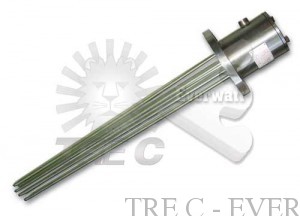
GENERAL CHARACTERISTICS:
The cartridge resistors on flange for air heating are manufactured by highly innovative production solutions, starting from first quality materials coming from the best markets worldwide, which allow to manufacture a heater complying with the highest reliability standards. They are made for various industrial uses in the heating of gaseous fluids.
This type of heaters guarantees optimum performance and efficiency in maintaining temperature of gaseous fluids (air, vapors, gas, etc …) whose thermal process takes place in the presence of safe installation.
Thanks to their compact design, it is possible to install a very high surface density (W / cm²), which allows them to reach very high operating temperatures thanks to the extreme proximity of the resistive wire spiral to the inner wall of the sheath which guarantees an immediate and optimal thermal exchange with the outside environment, which gives this type of resistance a longer working life than conventional armored heaters, as well as remarkable energy savings, excellent insulation at high temperatures, excellent resistance thermal and mechanical shocks and the possibility of direct control (version with internal thermocouple).
The heating elements that make up the tubular bundle can take various forms that make them suitable to be easily installed even in pipes, tanks, tubular ducts or pressure tanks, either in horizontal or vertical position, for direct or indirect heating of gaseous fluids intended for the most unlimited use in the main industrial sectors.
Designed to work even in extreme conditions in the presence of an explosive atmosphere, this type of flame-retardant electric heaters guarantees optimum heat exchange, even in very compact dimensions.
The flush-mounted cartridge heater consists of a stainless steel tube inside which a ceramic insulator is fitted to withstand temperature variations; inside it is inserted one or more U-bent U-shaped spirals in a Ni-Cr 80/20 resistive wire of a given section, able to guarantee optimum working conditions depending on the required power density. In turn, the spiral is immersed in powder of magnesium oxide (MGO) suitably compacted.
These heaters are powered by pure nickel-plated flexible cables insulated in PTFE and glass fibers; Moreover, they can be built in any power, diameter, length, power and voltage of 1 and more circuits, as well as with differentiated power.
They can be equipped with flange mounts of any type, DIN, ANSI, or any other standard, but also custom size flanges on the drawing. Also, with flexible, rigid, elbow protectors, etc.
They can also be built with built-in thermocouples (standard models in stock with thermocouple type J), with special cable protections, 90 ° cable outputs and other non-standard finishing types on customer specifications.
Furthermore, they can also be constructed with cold sections at the ends or with differentiated power sections and with 2-3 separate power circuits; this finishing is especially used in the construction of flange cartridge electrical resistances over 500 mm long, with a power density <15 W / cm².
To ensure the design of an efficient electric processor fitted with a threaded plug or flange ATEXit is necessary to know the following technical parameters:
Among the most common applications, it can be found:
Advantages in using high-density cartridge resistors:
CERTIFIED QUALITY PRODUCT
The entire production cycle of flange cartridge resistors is subjected to the most rigid dimensional and electrical tests in accordance with our ISO 9001: 2008 certified quality system and fully complies with the requirements of CEI / EN ( EN 60335-1 CE standards and, where required, PED97 / 9 / EC).
This type of cartridge heaters consists of a tube bundle formed by one or more electric heating elements of varying diameters having electrical contact perpendicular or with 90 degree power output, which is welded to TIG on threaded NPT, GAS , 1 “to 2” and 1/2 “flanges of different sizes according to UNI / DIN, ANSI, JSC standards, or unaligned flanges of variable dimensions according to customer specifications, depending on operating pressure and temperature of work.
The part of the electrical wiring is housed in standard polycarbonate, die cast aluminum, carbon steel or stainless steel 304 and 316 stainless steel with IP40, IP55, IP65, IP67 certified dust resistance fluids.
The surface load (W / cm2) of these types of flame-retardant electrical resistors is appropriately determined, from time to time, depending on the conditions of use and the type of fluid to be heated; In addition to these factors, the maximum working temperature and working environment are also variable, which directly influences the choice of the type of sheath material with which to construct the tube bundle of these heaters (Stainless Steel AISI304, AISI 321, AISI 316L , Incoloy800, Inconel 600). Equipped with accurate thermoregulators (fixed thermostats with thermocouple and / or thermocouples “J” or “K”), suitable for protecting the heater from overheating and premature damage, have a ATEX electrical wiring heads with properly dimensioned power inputs (metric pitch ‘M’, conical ‘Gk’ or ‘NPT’) according to the customer’s specific needs, depending on the number of elements installed, as well as the power and the amperage which determines the power cable section.
This special type of heaters is particularly suitable for all aeronautical and aerospace, military, and medical uses, as well as on molds and continuous cycle machines that have high plant shutdown costs.
SOME EXAMPLES: